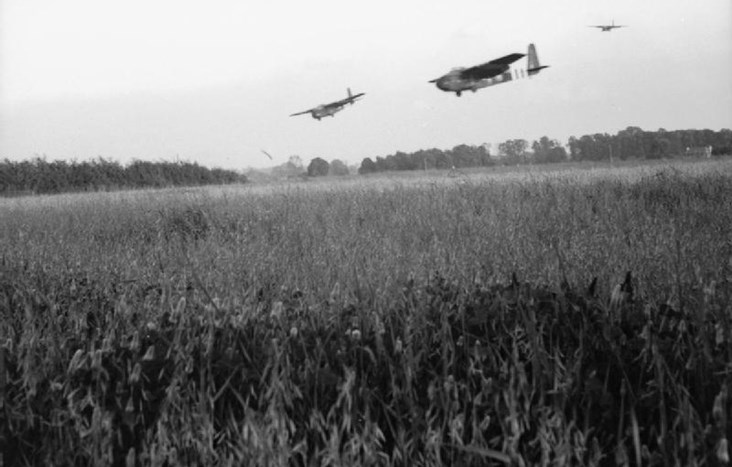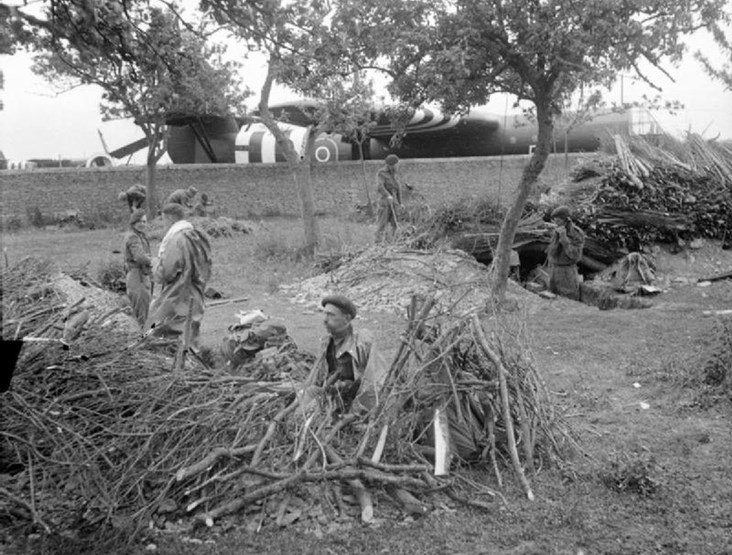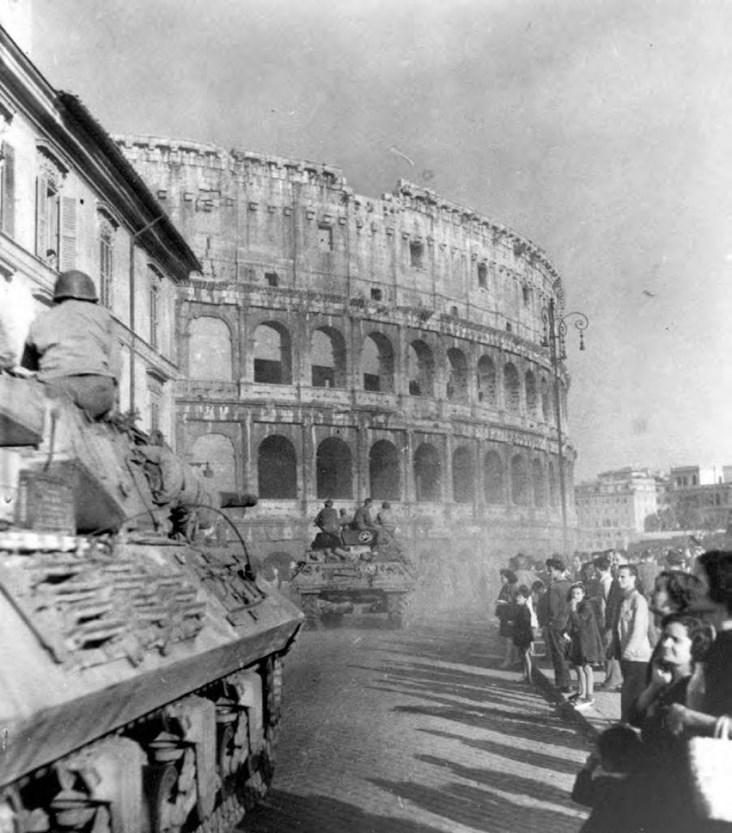I Was There! - How We Smashed Into Western Europe
By Leonard Mosley, for Combined Press.
The War Illustrated, Volume 8, No. 184, Page 120-121, July 7, 1944.
How went the first hours of D-Day? In these personal stories glimpses are give of some of the actions and incidents that made June 6, 1944, memorable as the actual commencement of the greatest combined operation known to mankind – the mighty assault on Hitler's fabled fortress in the West to free the enslaved peoples of Europe.
I parachuted into Europe at two minutes past one a.m. this morning, six-and-a half hours before our seaborne forces began the full-blown invasion of Festung Europe; and I have seen, done and experienced a lot since then. I was near the shore, hiding from Nazi patrols as I watched our first forces go ashore from the sea at 7.15. I have seen a few thousand paratroops and glider-borne troops, whom I nominate now as the bravest, most tenacious men I have ever known, hold the bridgehead against Hitler's Armies for over sixteen hours despite overwhelming odds.
Our job as an airborne force was to silence a vital coastal battery, which if still in operation might have blown our ships to bits as they came to the shore. We silenced it. And our other just as vital job was to secure two important bridges over the canal and river north of Caen, to prevent them from being blown up, and to hold them against all-comers until the main Armies arrived. We are still holding them. They are still intact.
I emplaned in “C for Charlie”, a great black bomber, at 11.20 p.m., and we took our place in the taxi-ing line of planes that stretched from one end to the other of one of the biggest airfields in Britain. There were Lancashire men, Yorkshiremen and Northumbrians mostly in our “stick” of paratroopers, the beefiest bunch of armed men I have ever seen. Preceding them by half an hour were the gliders and planes of paratroopers who were going to make a do-or-die attempt to take vital bridges before they could be blown up. Those gliders were going to crash themselves on the buttresses of the bridges themselves, and then, aided by paratroopers, were to capture the bridges and all surrounding land. It was our job to bring them aid within thirty minutes of their surprise attack, and to “infest” the whole area for a hundred square miles around to prevent the Nazis from counter-attacking.
It was five minutes to one when the light snapped off and a hole in the plane was opened. Under it we could see the coast of France below – and a garish sight it was, for flak from the coast defences was spouting flame everywhere. In great globes of red and purple it burst all round our plane as it coasted in and down to the dropping zone. And we were scared by it – until the red light flashed before our eyes and then swiftly changed to green, and we were all madly shiffling down the hole and jumping into space. I looked, as I twisted down, for the church I had been told to spy for a landmark, and for the wood where we were later going to rendezvous as a fighting force. But the wind had caught me, and was whisking me east. Faster and faster I twisted, and I had to wrestle with my straps to get me straight. By that time I had come down in an orchard outside a farmhouse. And as I stood up with my harness off and wiped the sweat off my brown-painted face, I knew I was hopelessly lost. Dare I go to the farmhouse and ask for directions? Suddenly there was a rip and tear in my flapping jumping-smock, and I flung myself to the ground as machine-guns rattled.

 British Airborne Troops, down to earth in Normandy, promptly dig in (above). The British 6th Airborne Division has won high praise in the invasion battles; stories are given in this page and in page 121. Giant Hamilcar gliders, towed by Halifaxes, are about to touch-down in a French field (top); the fast and light tanks they carry will emerge ready for immediate action. Photos, British Official.
British Airborne Troops, down to earth in Normandy, promptly dig in (above). The British 6th Airborne Division has won high praise in the invasion battles; stories are given in this page and in page 121. Giant Hamilcar gliders, towed by Halifaxes, are about to touch-down in a French field (top); the fast and light tanks they carry will emerge ready for immediate action. Photos, British Official.
There was silence, then two more smashing explosions. Hand-grenades, this time. I could now see figures manoeuvring in the moonlight. I dived into the next field, and began to run at the crouch. And then, suddenly, at the farther edge there were two more figures. They were coming towards me, and they were carrying guns. What might have happened is one of those “ifs” of my private history – only there was a crash of Sten gun fire instead, and both men crumpled up not fifteen yards from me. Into the field stealthily came five men to challenge me – and I was with our own paratroopers again.
For two long, weary hours we wandered the country. We hid from German patrols in French barns. We shot-up a Nazi car speeding down a lane. When we were lying in a ditch on the outskirts of a village, a youth appeared with a German flask full of Normandy wine and, after we had drunk it, he led us, by a roundabout route, away from the enemy. And just after 3 a.m. we made our rendezvous – the bridges. Over both the river and the canal, spans were in our hands and firmly held by paratroop machine-gunners. Only beyond, in the west country, could tracer be seen and the noise of battle heard as we beat back a Nazi counterattack. And then, at 3.20 every Allied paratrooper behind the so-called Atlantic Wall breathed a sigh of relief as he heard the roar of bombers coming in slow, bombers towing gliders towards the dropping ground.
We watched them in the pale moonlight and glare of flak, unhooking, and then diving steeply for earth. We saw one, caught by ack-ack, catch fire and fly around for three or four minutes, a ball of flame. We heard the crunch of breaking matchwood as gliders bounced on the rocks and careered into still-undestroyed poles. Out of every glider men were pouring, and jeeps, and anti-tank guns and field guns – and we knew that if Nazi tanks did come now we could hold them.
And now, as a faint glow began to appear in the eastern sky, our eyes turned upwards and westwards. For there was a roaring that rapidly grew to a thunderous roll that never stopped. We knew the climax of phase one of the invasion was approaching now. Here were bombers, swarming in like bees to give the Nazi coastal defences their last softening-up before our seaborne forces landed. And what a sight it was to see. We were about two miles away, but the shudder of explosions lifted us off the ground. Soon the sky was lit with a green and purple glow from burning Nazi dumps, and still more bombers swarmed in.
As dawn came I moved across country through Nazi patrols to get nearer to the coast. Wherever we moved there were traces of our airborne invasion. Emptied containers, still burning their signal lights, were scattered in fields and orchards.
Wrecked gliders littered the ground, some of them splintered to matchwood. There were parachutes lying everywhere. Eventually we reached high ground overlooking the coast and waited until our watches showed 7.15. A few minutes before it there was an earthshaking holocaust of noise. Approaching the coast under cover of naval ships, the invasion barges were coming in, and coming in firing. It was a terrific barrage that must have paralysed the defences. Then ships began nudging towards the beaches. The invasion at long last had begun!
Previous and next article from I Was There!
I Was There! - We Knew Our Sister Ship Would Sail No More
Two recent actions off the Ushant shore were notable as being the first naval actions which ships of the Royal Canadian Navy have ever fought against enemy surface ships. This account of the passing o
I Was There! - I Went With the First Glider-borne Troops
How went the first hours of D-Day? In these personal stories glimpses are give of some of the actions and incidents that made June 6, 1944, memorable as the actual commencement of the greatest comb
Index
Previous article
As Allies Reach the End of the Road to Rome
Armour of the 5th Army rolls past the ancient Colosseum in Rome, which our triumphant troops occupied on the night of June 4, 1944, while cheering Italians line the pavement. Before the liberators,
Next article
I Was There! - I Went With the First Glider-borne Troops
How went the first hours of D-Day? In these personal stories glimpses are give of some of the actions and incidents that made June 6, 1944, memorable as the actual commencement of the greatest comb




